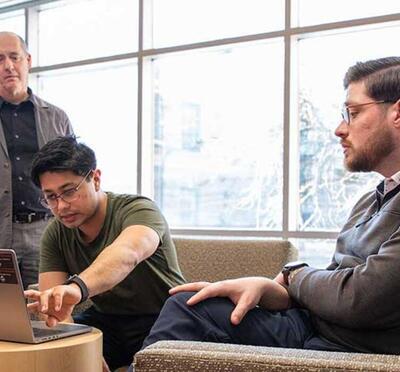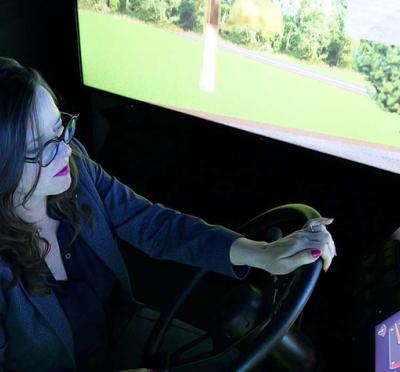Amy Glen loves skiing, so much that it factored into her decision to attend the University of Vermont, where the Alaska native majored in biology and competed with the university’s ski team.
After graduating with her bachelor’s degree, Glen worked at a lab that conducted analytical chemistry studies for pharmaceutical companies, where she worked with a lot of Excel spreadsheets. She realized that automating the manual data entry tasks would help her become more efficient in her job, but she didn’t have any programming background.
“I learned enough Visual Basic for Applications to write a macro and I thought, wow, this is awesome,” Glen said. “So I started learning more programming from there, a little bit at a time.”
That small taste sparked Glen’s interest in computer science, and she decided to enroll in Oregon State University’s online postbaccalaureate program in computer science in 2017.
“I was really grateful that the program existed,” Glen said. “I considered doing a master’s program in computer information systems at another university, but that wasn’t quite what I wanted to do, and I didn’t have the necessary prereqs for a computer science program.”
She also didn’t want to go back to school full-time to get another bachelor’s degree, and Oregon State’s online program allowed her to set her own pace while continuing to work full-time. The flexibility of the program also allowed Glen to take a break in 2018 to help set a startup company on its feet, which required her full attention for a year.
An undergraduate research experience changes everything
She resumed online classes in 2019. Knowing that she eventually wanted to get an advanced degree with the goal of conducting research in academia or industry, Glen applied for a Research Experiences for Undergraduates program in Associate Professor Stephen Ramsey’s lab.
Ramsey, who holds a joint appointment in computer science and biomedical sciences, applies bioinformatics, machine learning, artificial intelligence, and systems biology to the identification and treatment of diseases.
Glen worked on one of Ramsey’s research projects, sponsored by the National Institutes of Health, to integrate large volumes of data from myriad sources in biomedicine to help health professionals find possible solutions to treat rare diseases.
Glen’s background in biology is a great match for this research area, providing her a different perspective from that of most computer scientists.
“At first I was a little bit sad that I missed out on an undergraduate computer science experience,” Glen said. “But as I got up to speed and I didn’t feel behind my peers, I realized that it’s totally an asset coming from a different background like I do.”
Her previous career is giving her an advantage as well.
“Her experiences working at a lab in industry and as a startup founder give her really great instincts for working on a software team,” Ramsey said.
Glen thought she would wait about a year before attempting an advanced degree, but Ramsey encouraged her to apply for computer science doctoral programs right away.
“She has a knack for solving technical problems quickly and decisively,” he said. “On her own initiative, she solved a key challenge for our research that I had shied away from working on because I thought it would be too hard — this before she even started on her Ph.D.!”

Taking the leap to graduate school
Though she wasn’t sure she had the qualifications to get accepted to a graduate program, Glen applied at six schools in fall 2019 and was accepted at four universities, including Oregon State.
She decided to continue her studies at Oregon State because she enjoyed the research she was working on. Making her decision a bit easier, the School of Electrical Engineering and Computer Science offered her a fellowship in the Outstanding Scholars Program. Glen is also an ARCS scholar.
Though she didn’t finish the postbacc degree in computer science, Glen jumped right into her Ph.D. program and continued to work with Ramsey on the same research project she had started as an undergraduate.
Glen and Ramsey are working with the Institute for Systems Biology in Seattle and Penn State to integrate large amounts of information in disparate and heterogeneous databases.
“For instance, there are databases that connect genes with diseases, or proteins and their mechanism of interaction with drugs,” Glen said. “There are so many databases, but they’re all in different formats and are so disjointed that it’s difficult to piece together all that information to allow reasoning across the whole dataset.”
The goal is to integrate all those sources and make them speak a common format so they can create a querying system that health professionals can use to help find possible answers for rare diseases.
Glen still loves skiing. Since moving to Corvallis, she’s been able to take advantage of the town’s proximity to the mountains. She also enjoys mountain biking and rock climbing. After she graduates, Glen plans to work for a nonprofit research institute or in academia. Wherever it is, it will likely be where she can hit the slopes often.


